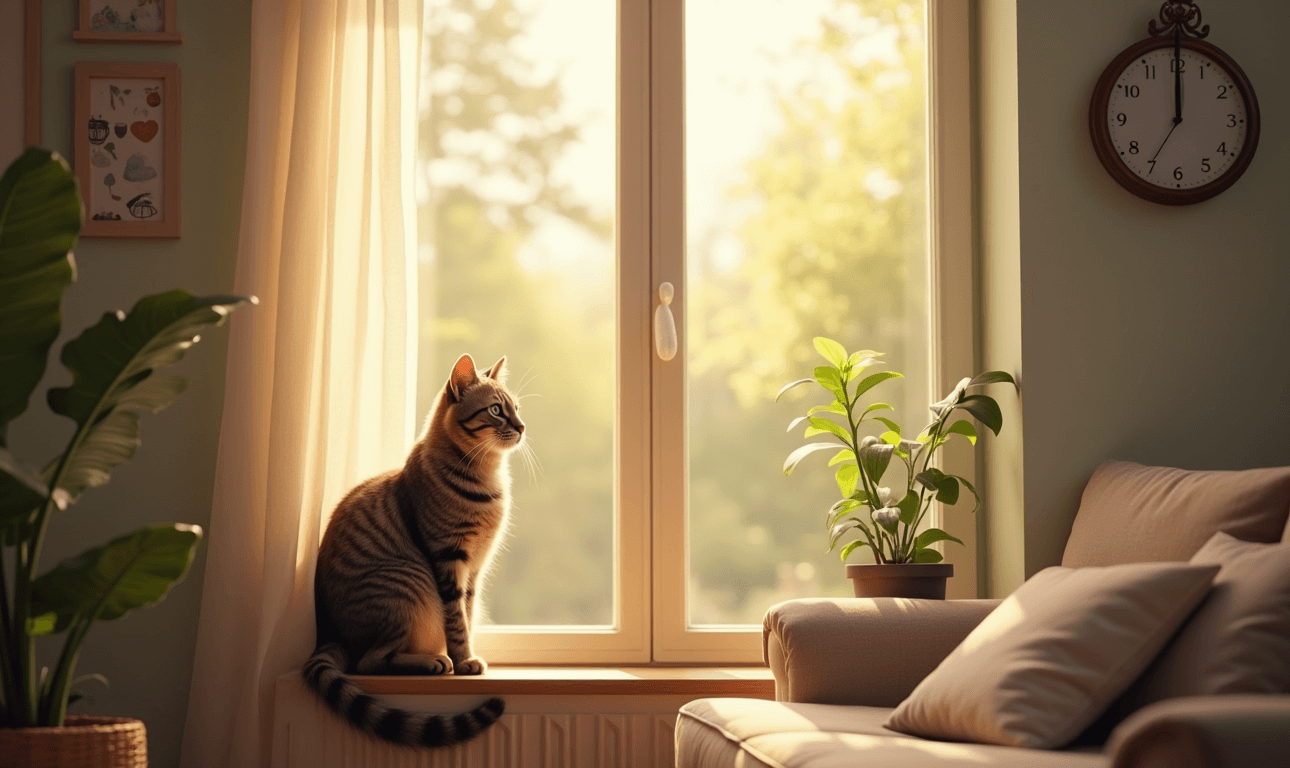As a cat owner, you might wonder how long can cats be left alone. Cats are independent but still need your care. We’ll look at the best times to leave your cat alone and how to keep them happy and safe.
Cats are self-reliant but need care and companionship. Knowing their natural behaviors helps you figure out how long they can be alone. By preparing your home and providing what they need, your cat will feel secure, even when you’re away.
Table of Contents
Understanding Your Cat’s Independence and Basic Needs
Cats are often seen as independent, but they need more than just to be left alone. It’s important to know their natural behaviors and social needs. Also, their physical and emotional needs when they’re home alone.
Natural Feline Behavior and Social Requirements
Cats are solitary animals but they still need social interaction. In the wild, they live in small groups and interact with each other. When left alone for a long time, your cat may feel lonely and bored. This can cause behavioral problems and even feline separation anxiety.
Physical and Emotional Needs When Home Alone
Cats have specific physical and emotional needs, even when you’re not there. Proper care means making sure they have fresh water, a clean litter box, and healthy food. Also, giving them engaging toys and environmental enrichment can help them feel happy and content.
Signs of Cat Separation Anxiety
- Excessive vocalization, such as meowing or crying
- Destructive behaviors, like scratching or chewing
- Refusal to eat or drink
- Excessive grooming or self-mutilation
- Elimination outside the litter box
Knowing these signs of cat separation anxiety helps you address any issues. It ensures your cat’s well-being, even when you’re not there.
How Long Can Cats Be Left Alone: Safe Time Limits
Leaving your cat alone for too long can be bad for them. The right amount of time depends on their age, health, and personality. Each cat is different.
Kittens and older cats can’t handle being alone as well as adult cats. Kittens need to eat often and need lots of attention. Older cats might get anxious or upset if left alone for too long.
Adult cats can usually handle being alone for 8-10 hours a day. But, this can change based on your cat’s needs and how they act. Some cats might need more time with you, while others are okay with being alone for a bit longer.
Watch your cat for signs of stress or anxiety. Look for things like too much meowing, scratching, or not using the litter box. If you see these signs, you might need to change your plans or find someone to check on your cat.
| Cat Age | Recommended Alone Time Limit |
|---|---|
| Kittens (under 4 months) | A few hours |
| Healthy Adult Cats | 8-10 hours |
| Senior Cats | Varies, may need more frequent check-ins |
Your cat’s happiness and health are the most important things. Knowing how long they can be alone and watching their behavior helps keep them happy and healthy when you’re not there.
Essential Preparations Before Leaving Your Cat Home Alone
It’s important to make sure your cat is safe and happy when you’re not there. Before you leave, prepare your home and meet your cat’s needs. These steps will help your cat feel comfortable and happy while you’re away.
Creating a Cat-Safe Environment
Cats can get into trouble when left alone. Check your home for dangers. Make sure electrical cords are out of reach and plants are safe. Also, make sure all windows and doors are closed.
Food, Water, and Litter Box Setup
Food, water, and a clean litter box are key for your cat’s health. Fill their bowls and place them where they can easily get to them. Keep the litter box clean and full. You might want to get an automatic litter box or ask someone to check it for you.
Entertainment and Comfort Provisions
Cats need things to do and places to rest. Before you go, give them toys, scratching posts, and perches. Also, leave out comfy bedding and a place to hide. This will help them feel happy and secure. These simple steps can make a big difference in preparing cats for owner absence and cat care while away.
| Preparation Checklist | Importance |
|---|---|
| Secure the environment | Ensures your cat’s safety by removing potential hazards |
| Provide ample food and water | Meets your cat’s basic needs during your absence |
| Maintain a clean litter box | Promotes good hygiene and a comfortable living space |
| Offer engaging toys and activities | Prevents boredom and promotes mental and physical well-being |
By preparing cats for owner absence and taking care of them while you’re away, you can relax. You’ll know your cat is safe, happy, and well-cared for when you’re apart.
Alternative Care Options for Extended Absences
When you’re away for work, travel, or other reasons, your cat’s well-being is key. Luckily, there are many ways to make sure your cat is cared for while you’re gone.
Pet Sitters: A Personalized Approach
Choosing a professional pet sitter is great for cats who love their home. They’ll visit to feed, play, and check on your cat. This keeps your cat in their own space, reducing stress.
Cat Boarding Facilities: Specialized Care and Amenities
For cats who love company or need special care, boarding facilities are perfect. They have staff who focus on making your cat’s stay safe and fun. You’ll find playtime, grooming, and vet services available.
Tapping into Your Social Network
Ask friends, family, or neighbors to check on your cat or care for them temporarily. This is a budget-friendly way to keep your cat happy and safe at home.
Whichever care option you pick, make sure it’s right for your cat. Research well to find a safe and comfortable place for them. This way, you can enjoy your time away, knowing your cat is in good hands.
Conclusion
Understanding your cat’s needs is key when you must leave them alone. Cats are independent but still need care and a safe place. Recognizing signs of separation anxiety and providing comfort can help.
It’s important to balance your cat’s independence with their need for attention. With the right planning, you can keep your cat happy and safe until you return. This strengthens your bond with your cat.
Your cat’s happiness should always come first when you’re away. Knowing their needs and taking steps to meet them shows you care. This way, your cat feels loved and cared for, even when you’re not there.
FAQ
How long can I leave my cat alone?
The time you can leave your cat alone varies. It depends on their age, health, and personality. Adult cats usually can handle 8-12 hours alone. Kittens and older cats should not be left for more than 4-6 hours.
But, every cat is different. You should watch your cat’s specific needs and adjust the time accordingly.
What are the signs of cat separation anxiety?
Signs of cat separation anxiety include a lot of meowing, scratching, or destructive acts when you’re away. They might not eat, groom, or use the litter box. They could also become clingy or anxious when you’re getting ready to leave.
How can I prepare my home for my cat’s comfort and safety while I’m away?
To make your home safe and comfy for your cat, ensure they have fresh food and water. Make sure the litter box is clean and they have fun toys or activities. Provide cozy spots for them to rest.
Consider leaving calming music or the TV on. Also, keep dangers like wires, cleaning products, and small objects out of their reach.
What are some alternative care options if I need to be away for an extended period?
If you’ll be away for more than a day or two, think about getting a pet sitter, cat boarding, or a trusted friend or family member. They can check on your cat, feed them, and clean the litter box. This way, your cat will have someone to keep them company and meet their needs while you’re away.






